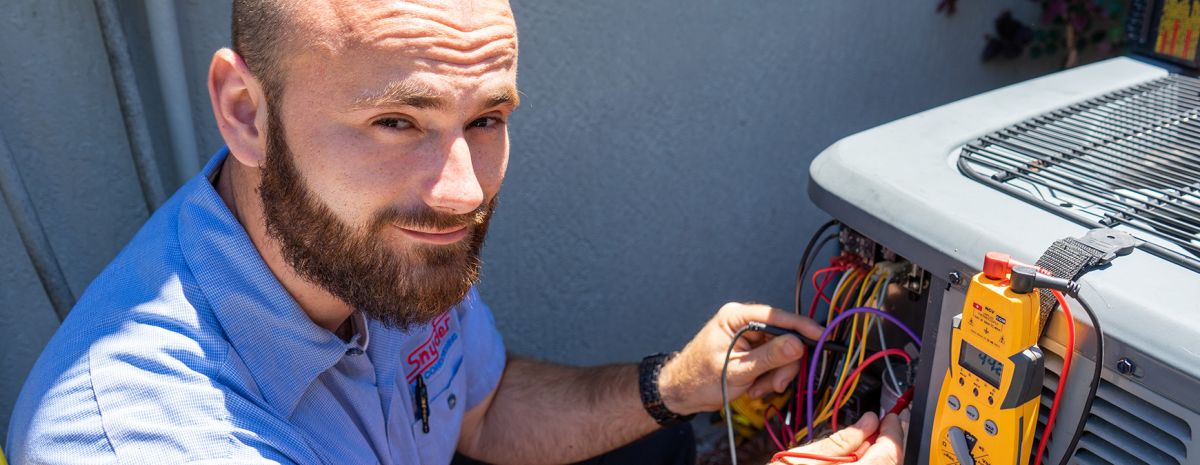TWS is a Great Training Option for Everyone
Learn more about how we can prepare you to advance your career.
Are you thinking about becoming an HVAC tech in Jacksonville, Florida? Good news!
Florida is one of the top U.S. states with the highest employment levels for HVAC technicians.*Jacksonville specifically ranks as one of the metropolitan areas with the highest levels of HVAC employment.
If you live in the Jacksonville area or are considering moving there, schools like Tulsa Welding School offer accredited HVAC classes to prepare you for a career in HVAC.
Don’t feel overwhelmed: this helpful article dives into all the things you should think about when taking HVAC classes and pursuing an HVAC career in Jacksonville, FL.
Have You Considered a Career in the Skilled Trades?
Fill out the form to recieve a no obligation info packet.
Jacksonville HVAC Certification Requirements
Some states have licensing requirements for HVAC workers.
Florida is one of them. If you plan on working in HVAC in the Sunshine State, you can prepare to apply for, maintain, and renew your official state license throughout your career.
To qualify for licensure as an HVAC tech, you must already have some experience under your belt. Generally speaking, you will need at least 48 months of practical experience under the supervision of a licensed contractor.
After working for at least 4 years under HVAC supervision to meet Florida eligibility requirements for a contractor license, you would sit for the licensing exam, pay the application fee, and obtain proper insurance coverage.
How do I get HVAC certified in Jacksonville, Florida?
Let’s come back to that 48-month expectation: This would theoretically mean you are employed as an HVAC trainee or apprentice with a company for those 48 months as you learn the ropes. It’s a big part of becoming licensed as an HVAC contractor in Florida.

New: Industrial Maintenance
Learn About Our New Advanced Industrial Maintenance Program in Houston
Tulsa Welding School is proud to announce our newest program offering available at our Houston Campus – Advanced Industrial Maintenance Technology! Learn the skills you need to take on the industries of manufacturing, distribution, energy production and facility maintenance in as few as 7 months.
In order to be competitive for an apprenticeship or entry-level HVAC job, the Bureau of Labor Statistics reports that many employers prefer to hire candidates who already have a postsecondary education, such as vocational training.
HVAC systems are increasingly complex, and education is your key to understanding that complexity! HVAC classes can prepare job candidates for a future in the workforce by training them on HVAC systems, processes, methods, and equipment.
What HVAC Classes Do You Need to Be an HVAC Technician in Jacksonville, FL?
The field of HVAC has many distinct specializations, such as refrigeration mechanics or boiler operators, but for most branches of HVAC, you will need to understand the fundamentals of heating and cooling systems.
You’ve come to the right place: The TWS Refrigeration Technologies program, available at the Jacksonville campus, is one example of what could be included in an HVAC education!
This HVAC training program includes introductions to comfort and refrigeration systems to prepare students for entry-level positions in the HVAC industry.
Here are examples of the HVAC classes included in the Refrigeration Technologies program:
- Fundamentals of Electricity: In this class, students learn the basics of HVAC wiring and get a chance to practice dual voltage systems.
- Fundamentals of Solar: This class introduces students to photovoltaic (PV) systems, including design and installation.
- Fundamentals of Refrigeration: In this class, students learn the mechanical and physical properties of the refrigeration cycle, as well as essential tools used in the industry.
- Comfort Systems – Residential: This class trains students in building schematics and wiring A/C and heating systems.
- Comfort Systems – Commercial: This class teaches students how to remove and replace HVAC components. EPA certification for safe handling of refrigerants is also addressed.
- Refrigeration Systems and Practices: This class provides practice with maintaining and replacing components of residential and commercial refrigerators and freezers.
- Advanced Troubleshooting Techniques: This class helps students prepare for real-world troubleshooting with the E-STAR trainer.
How long are HVAC classes?
We get that studying for four years for a college degree isn’t for everyone. What’s great about an HVAC training program is that you probably won’t be in school for that long.
The BLS reports that most postsecondary HVAC training courses can last 6 months to 2 years.
In fact, our very own Refrigeration Technologies program outlined above can be completed in 7 months—less than a year!
Each course inside an HVAC program also takes a unique set of hours to complete. For example, the Fundamentals of Refrigeration class includes 90 lecture hours and 10 lab hours for a total of 100 hours, not including 8 outside prep hours.
Each training program will be different, of course. For example, the other HVAC training program offered at TWS Jacksonville is the Electro-Mechanical Technologies, which can be completed in 9 months, and also teaches students the basics of electrical wiring. More things to learn equals more skills in the future!
HVAC Classes in Jacksonville
If you’re eager to learn more about enrolling in HVAC training in Jacksonville, FL, but not quite ready to start, don’t worry, we get it. Deciding what to do with your life is a huge decision, and you deserve to feel confident that you’re making the right one.
Feel assured that training for a career in HVAC is right for you: check out the difference between HVAC techs and HVAC engineers in Jacksonville.
*Employment is expected to grow for Heating, Air Conditioning, and Refrigeration Mechanics and Installers (499021) in the US by 40,100 jobs from 2021 to 2031. https://www.careeronestop.org
This blog has been labeled as archived as it may no longer contain the most up-to-date data. For a list of all current blog posts, please visit our blog homepage at https://www.tws.edu/blog/







